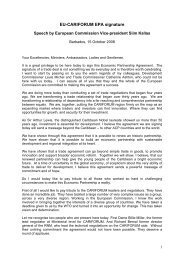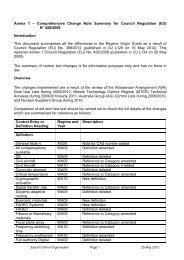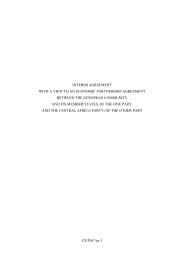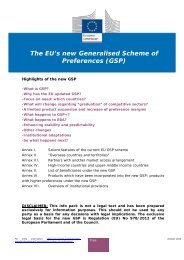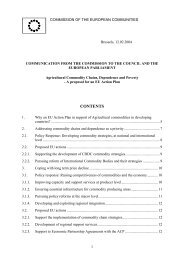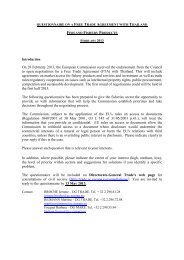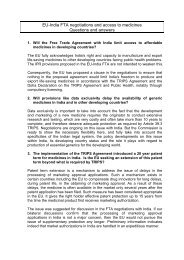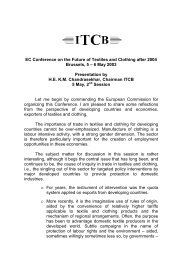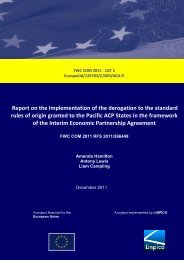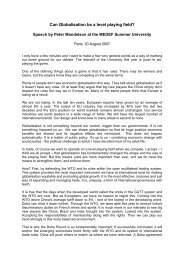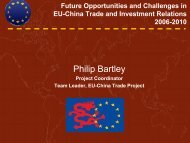Road Map for Economic Partnership Agreement Negotiations ...
Road Map for Economic Partnership Agreement Negotiations ...
Road Map for Economic Partnership Agreement Negotiations ...
You also want an ePaper? Increase the reach of your titles
YUMPU automatically turns print PDFs into web optimized ePapers that Google loves.
ECONOMIC COMMUNITY OF<br />
WEST AFRICAN STATES<br />
EUROPEAN COMMISSION<br />
COMMUNAUTE ECONOMIQUE<br />
DES ETATS DE L’AFRIQUE<br />
DE L’OUEST<br />
COMMISSION EUROPENNE<br />
MEETING OF MINISTERS OF TRADE ON THE ECONOMIC<br />
PARTNERSHIP AGREEMENT BETWEEN WEST AFRICA AND THE<br />
EUROPEAN COMMUNITY<br />
ACCRA, 4 TH AUGUST 2004<br />
<strong>Road</strong> <strong>Map</strong> <strong>for</strong> <strong>Economic</strong> <strong>Partnership</strong><br />
<strong>Agreement</strong> <strong>Negotiations</strong> between West<br />
Africa and the European Community
INTRODUCTION<br />
1. The negotiations on the <strong>Economic</strong> <strong>Partnership</strong> <strong>Agreement</strong> (EPA) between the<br />
African, Caribbean and Pacific (ACP) countries and the European Community (EC)<br />
were launched in Brussels on 27 September 2002. The opening Ministerial<br />
Conference decided that the negotiations would be conducted in two phases. In<br />
accordance with the relevant provisions of the Cotonou <strong>Agreement</strong>, the EPA shall<br />
enter into <strong>for</strong>ce no later than 1 January 2008.<br />
2. The first phase of negotiations were conducted at the all–ACP level and<br />
covered horizontal issues of interest to all parties. On 2 October 2003, the ACP<br />
Council of Ministers and the EC Commissioners <strong>for</strong> Trade and Development declared<br />
the results of the first phase to be satisfactory in view of the high degree of<br />
convergence achieved. They adopted the joint report ACP/00/118/03 Rev.1-ACP-<br />
EC/NG/NP/43, dated 2 October 2003, on phase 1 of the EPA negotiations. This<br />
report will serve as a point of reference and guide <strong>for</strong> the conduct of the negotiations<br />
between West Africa and the European Community.<br />
3. The second phase of the negotiations, as far as West Africa is concerned, was<br />
launched in Cotonou on 6 October 2003.<br />
4. In view of these negotiations, the Conference of Heads of State and<br />
Government adopted a negotiating mandate <strong>for</strong> the negotiation of the <strong>Economic</strong><br />
<strong>Partnership</strong> <strong>Agreement</strong> between West Africa (ECOWAS + Mauritania) and the<br />
European Community, ahead of the negotiations. The terms of the mandate centre<br />
on the following objectives:<br />
• The progressive establishment, in accordance with WTO rules, of a free<br />
trade zone between ECOWAS and the European Community <strong>for</strong> a period<br />
of twelve years, starting from 1 st of January 2008;<br />
• The need to accord priority to development and poverty reduction;<br />
• Cooperation in trade-related matters;<br />
• Deepening of the integration process in West Africa.<br />
• Enhancement of competitiveness: capacity building and upgrading;<br />
• Improved access <strong>for</strong> West African exports to the EU market.<br />
5. The West African region and the EC adopted this road map <strong>for</strong> EPA<br />
negotiations.<br />
6. The two parties reaffirmed the commitments made under the Cotonou<br />
<strong>Agreement</strong> and recalled that the main objective of the <strong>Economic</strong> <strong>Partnership</strong><br />
<strong>Agreement</strong> is to promote the deepening of the regional integration process and<br />
sustainable economic development in the West African region. In this regard, the<br />
EPA and the national development strategies of the West African region are<br />
complementary and mutually supportive.<br />
1
I. Deepening of the Integration Process in West Africa<br />
7. It should be recalled that Article 35, paragraph 2, of the Cotonou <strong>Agreement</strong><br />
states that “economic and trade cooperation shall build on regional integration<br />
initiatives of the ACP States, bearing in mind that regional Integration is a key<br />
instrument <strong>for</strong> integration of ACP countries into the world economy”. Since one of<br />
the main objectives of the EPA is to support the integration process in West Africa on<br />
the basis of priorities determined by the region, the rhythm of the West African trade<br />
liberalisation in relation to the European Community shall be related to the degree of<br />
this integration and shall be pursued flexibly and asymmetrically.<br />
8. With regard to the negotiation and establishment of the EPA, the region’s<br />
integration priorities are centred, in addition to the actions that seek to strengthen the<br />
competitiveness, on macro-economic and sector wide policies aimed at ensuring a<br />
unified market, and on the establishment of a surveillance mechanism of the free<br />
trade area.<br />
9. To this end, the projects comprising the effective establishment of the free<br />
trade area and the gradual establishment of the Customs Union deserve special<br />
attention.<br />
10. With regard to the West African free trade area, the extraordinary session of<br />
the ECOWAS Council of Ministers, held on the 1 st and 2 nd September 2003, listed the<br />
guidelines <strong>for</strong> ensuring the smooth functioning of the trade liberalisation scheme, an<br />
objective whose attainment is linked to the following :<br />
• correct implementation of the Community levy to ensure adequate<br />
compensation <strong>for</strong> loss of revenue,<br />
• organisation of in<strong>for</strong>mation and public awareness campaigns,<br />
• conduct of monitoring and evaluation missions<br />
• the existence of an efficient trade facilitation system.<br />
• With reference to the creation of a customs union, in view of the decision to<br />
extend the UEMOA Common External Tariff (CET) to the entire<br />
Community, based on the findings of a country-by-country impact study,<br />
the non-UEMOA member countries were requested in December 2002 to<br />
set up national units in order to facilitate the analysis and promotion of the<br />
national appropriation of the process which would lead to the introduction<br />
of the necessary re<strong>for</strong>ms. The function of each national unit is to draw up<br />
an action plan based on technical analyses and the results of consultations<br />
with the parties concerned. These action plans should serve as the basis<br />
<strong>for</strong> the <strong>for</strong>mulation of a regional programme <strong>for</strong> the adoption of the CET,<br />
and specify interim, special, and support measures.<br />
2
11. During this process, a convergence plan <strong>for</strong> national tariff structures within the<br />
framework of the regional CET, and support measures will be submitted <strong>for</strong> the<br />
approval of the Council of Ministers in December 2004. Consequently, the CET will<br />
take off on 1 st January 2005, allowing <strong>for</strong> a transition period of three years to enable<br />
Member States to make the necessary adjustments.<br />
12. The customs union is scheduled to come into existence on 1 st January 2008,<br />
with a uni<strong>for</strong>m application of the CET by all Member States.<br />
13. The proposed strategy <strong>for</strong> trade facilitation should be based on the following<br />
areas of activity:<br />
14. The simplification and harmonisation of procedures and regulations, starting<br />
with an inventory of the facilities available to the ports authorities, the transport<br />
system, the customs authorities, and the national guarantor <strong>for</strong> the Inter-State <strong>Road</strong><br />
Transit System. The following actions will be undertaken:<br />
• harmonisation of clearing and other customs <strong>for</strong>malities in<br />
ECOWAS,<br />
• circulation of a single customs declaration,<br />
• interconnection of customs computer systems, with the aim of<br />
rationalising procedures,<br />
• harmonisation of regulations relating to the axle load,<br />
• drawing up of a regional road control plan defining group checks at the<br />
point of departure, destination and at border posts<br />
• building of adjacent border posts at the land borders.<br />
• Prevention against propagation of HIV/AIDS on the main road<br />
infrastructures.<br />
15. Opportunities offered by in<strong>for</strong>mation technology: what needs to be examined<br />
is the extent to which approaches of e-commerce can translate into alternative<br />
solutions compared with hard copy documents; specifically, the Advanced Cargo<br />
In<strong>for</strong>mation System (ACIS), developed by UNCTAD will be studied, as well as the<br />
feasibility of the ‘<strong>Road</strong> Tracker’ and ‘Port Tracker’ modules.<br />
16. The promotion of road safety, by encouraging the development of road signs<br />
and training drivers.<br />
17. In the area of quality standardisation and control, the survey conducted in<br />
the region showed that Member States are at varying levels which can be classified<br />
within three categories:<br />
• countries that have created specialised independent structures <strong>for</strong><br />
quality standardisation and control.<br />
• countries that have included standardisation activities into a central unit<br />
of a ministerial department where sectoral structures, national<br />
committees, or even high level standardisation councils have been put<br />
in place.<br />
• countries which were still at the stage of creating a quality<br />
standardisation and control structure.<br />
3
18. Activities of quality standardisation and control in the sub-region are often<br />
limited to macroscopic examination and often touch on only the phytosanitary<br />
aspects. Just a few countries have a system of certification.<br />
19. In this area, many countries only have a legal metrology framework.<br />
20. It is in order to address this situation that we need to adopt and implement a<br />
regional promotional approach to quality standardisation and control, through a<br />
programme comprising the following specific areas:<br />
• the creation of national structures where they do not exist, and the<br />
strengthening of already existing ones.<br />
• the development of a policy on quality.<br />
• the training of staff involved in the activities of quality standardisation<br />
and control.<br />
• the institution of systems of certification.<br />
• the development of national centres <strong>for</strong> documentation and prescriptive<br />
in<strong>for</strong>mation.<br />
21. Capacity building in sanitary and phytosanitary (SPS) activities should be<br />
done according to the same method as that of quality standardisation and control.<br />
22. Two main objectives underscore discussions on investment within the<br />
framework of EPA negotiations:<br />
• Facilitation of an enabling environment <strong>for</strong> investment to mobilise<br />
internal resources and also promote the inflow of <strong>for</strong>eign capital,<br />
particularly by ensuring transparent, stable and feasible conditions;<br />
• The adoption of a Community legal framework on competition to<br />
remedy the issue of anti-competition practices in the region.<br />
23. One other important area of cooperation is that of intellectual property, <strong>for</strong><br />
which the strategy to be adopted should notably aim at putting in place a system of<br />
intellectual property rights that guarantees a reasonable balance between the<br />
promotion of innovation and technological development, which is an incentive <strong>for</strong><br />
technology transfer and the attainment of social development objectives.<br />
24. In conclusion, it is proposed that the two parties (the West African Region and<br />
the European Community) review, during the first three months of negotiations, the<br />
whole set of regional economic and trade integration policies and establish a list<br />
indicating the studies and support measures to be undertaken in order to give the<br />
EPA a regional reference framework and improve competitiveness in West Africa.<br />
These studies and measures will be submitted in view of their financing to the aid<br />
implementation authorities set out under the Cotonou <strong>Agreement</strong>, notably on the<br />
basis of the 9 th EDF Regional Indicative Prorgamme (RIP) resources.<br />
4
II) IMPROVING COMPETITIVENESS: CAPACITY BUILDING AND<br />
UPGRADING<br />
25. In order to achieve sustainable economic development of West African<br />
countries and the wider region, the West African region decided to prepare a<br />
competitiveness enhancement and upgrading programme. This should be based on<br />
dynamic economic cooperation which focuses on those areas of activity vulnerable to<br />
internal constraints and difficulties as a result of the regional integration process in<br />
West Africa, implementation of the EPA, or the integration of West African region into<br />
the world economy.<br />
26. In parallel with the strengthening of the regional integration process, the<br />
implementation of actions aimed at enhancing competitiveness should seek to<br />
maximise the dynamic benefits generated by the EPA and to assist West African<br />
countries to adjust their economies to the liberalisation process. This will ensure the<br />
development dimension of the EPA process. The main thrust of such actions will be<br />
to examine ways to develop supply capacity.<br />
27. Various programmes, identified or already at the implementation stage,<br />
contribute to the achievement of this objective. Using the strategic area of<br />
infrastructure as an example, NEPAD has offered new prospects <strong>for</strong> the development<br />
of such programmes, given the quality of advocacy which underscores this initiative.<br />
28. Within the framework of the EPA, whose approach largely corresponds with<br />
the concerns of NEPAD, the issue is to ensure a better targeting and strengthening in<br />
the search <strong>for</strong> competitiveness, as a reflection of the developments of the new<br />
framework, which will characterise in particular trade between West Africa and the<br />
European Union.<br />
29. That explains why the first category of activities to be undertaken consists of<br />
impact assessment, both at the regional and national levels.<br />
30. At this stage, the regional studies undertaken are on the various negotiating<br />
themes such as: market access and trade-related issues, agriculture, non-agricultural<br />
products and trade in services. It is expected that national impact assessments will<br />
be carried out between December 2003 and December 2005.<br />
31. The impact assessments should help provide answers to a number of<br />
questions on how to ensure the viability of the EPA by throwing light on the global<br />
repercussions that the EPA could have (<strong>for</strong> instance in the area of budget, volume of<br />
trade, etc…), and also by carrying out in-depth sectoral analyses, so as to help<br />
<strong>for</strong>mulate the necessary adjustment programmes.<br />
32. Also, the impact assessment process should include the following activities:<br />
• analysis of the consequences of change in the trading system;<br />
• evaluation of production structures and infrastructure;<br />
• analysis of institutional, human and physical capacity building needs;<br />
5
• evaluation of the EPA with regard to the objective of sustainable<br />
development.<br />
33. Together with the realisation of impact assessments, and as their results<br />
become available, it will be necessary to <strong>for</strong>mulate upgrading programmes that will<br />
pursue a dual objective: improving the business environment and, offering<br />
appropriate direct support to enterprises.<br />
34. A first phase of the upgrading programme should start in the first half of 2005,<br />
with the understanding that other programmes may eventually be <strong>for</strong>mulated in line<br />
with the issues that will have been identified. The <strong>for</strong>mulation of programmes <strong>for</strong><br />
upgrading will depend on the outcomes of impact assessments, and also on<br />
programmes already undertaken (ECOWAS has drawn up a regional quality<br />
promotion programme, and UEMOA, as well as some private sector organisations,<br />
have completed a programme <strong>for</strong> upgrading).<br />
35. With regard to the business environment, special emphasis will be given to the<br />
improvement of the macro-economic framework through the adoption of sound<br />
economic and financial policies, as well as the ability of the authorities to take up the<br />
challenge of competitiveness, particularly by way of promoting investment and the<br />
legal and fiscal framework.<br />
36. In the area of infrastructure and services <strong>for</strong> the private sector, ef<strong>for</strong>ts will be<br />
made to reduce the cost of factors of production such as transport, water, electricity,<br />
telecommunications through policy and development re<strong>for</strong>ms. The strengthening of<br />
public-private sector partnerships will be encouraged, especially concerning the<br />
funding of projected activities.<br />
37. Professional training and the diversification of the financial sector, in order to<br />
encourage its greater involvement in financing investment programmes, will equally<br />
be priority areas <strong>for</strong> capacity building.<br />
38. At the level of enterprises, the upgrading will aim at offering the required direct<br />
assistance to restructure and increase competitiveness, through such means as<br />
technical assistance and access to appropriate funding. The upgrading of<br />
enterprises ought to be governed by an appropriate regulatory framework (eligibility<br />
of industrial sector and enterprises and of services); it also ought to be taken care of<br />
by appropriate institutional arrangements, such as the steering committee of the<br />
upgrading programme and the office <strong>for</strong> upgrading of enterprises.<br />
39. In order to ensure compliance by the private sector, a key player in the quest<br />
<strong>for</strong> competitiveness and beneficiary of the programmes <strong>for</strong> upgrading, professional<br />
organisations are called upon to play a crucial role in the design and implementation<br />
of the programmes.<br />
40. As much as possible, research institutes shall be used <strong>for</strong> the sectoral and<br />
macro-economic monitoring of competitiveness, in such a way as to ensure the<br />
monitoring of expected outcomes from the capacity building and upgrading<br />
programmes, notably in terms of:<br />
6
- market share,<br />
- productivity gains,<br />
- job consolidation.<br />
41. In order to direct and support the adjustments that the EPA implementation<br />
will require, West Africa intends to conduct a study into the sensitive sectors as well<br />
as another study focusing on the identification of emerging market trends susceptible<br />
of offering the region new opportunities <strong>for</strong> growth.<br />
42. Finally, in order to improve the general framework <strong>for</strong> the implementation of<br />
the capacity building and upgrading programmes, the European Union and West<br />
Africa have agreed to pay special attention to cooperation and development. To this<br />
end, the two parties agree on the need to ensure financial coverage <strong>for</strong> the projects<br />
and programmes identified as part of the implementation of all components of the<br />
EPA. In order to achieve this, all the instruments and procedures in the Cotonou<br />
<strong>Agreement</strong> will be utilised along with complementary funding obtained, amongst<br />
other sources, from co-financing with the EU member states and other development<br />
partners.<br />
43. As the negotiations progress, in<strong>for</strong>mation meetings will be held to examine<br />
competitiveness enhancement programmes at various levels, notably within the<br />
framework of the RPTF, or according to procedures laid down in the Cotonou<br />
<strong>Agreement</strong>.<br />
44. In parallel to the activities designed to deepen the regional integration<br />
process, the <strong>for</strong>mulation and implementation of programmes to enhance<br />
competitiveness and upgrading will start in October 2004 and will continue until 2020.<br />
The actions pursued will be the following:<br />
• national Impact studies (2004 - 2005);<br />
• studies on the sensitive sectors and businesses in difficulty (2004 –<br />
2005);<br />
• <strong>for</strong>mulation of upgrading programmes <strong>for</strong> each country in the areas of<br />
business environment, infrastructure, other services and businesses<br />
(2004 – 2005);<br />
• implementation of the above programmes (until 2020).<br />
III.<br />
PREPARATION AND THE CONDUCT OF THE NEGOTIATIONS<br />
45. Preparatory activities ahead of the EPA negotiations will mainly involve:<br />
• definition of the EPA reference framework with regard to the technical<br />
barriers to trade and SPS measures, customs procedure and trade<br />
7
facilitation, with a view to ensuring free movement of goods within the<br />
region and between the region and the European Union;<br />
• harmonisation of the policies on standardisation, certification and SPS<br />
measures;<br />
• definition of a reference framework <strong>for</strong> border protection measures<br />
(customs tariffs and other measures);<br />
• definition, at the appropriate time, of objectives and procedures <strong>for</strong><br />
investment, competition and intellectual property;<br />
• definition of the general structure of the EPA (areas to be covered by<br />
the EPA);<br />
• conduct of the analyses of different liberalisation options <strong>for</strong> trade in<br />
goods and services;<br />
• <strong>for</strong>mulation of proposals <strong>for</strong> capacity building and other support<br />
measures in the various areas open to negotiation: border protection<br />
measures, technical barriers to trade and SPS measures, investment,<br />
competition and intellectual property policies. The proposals should be<br />
taken into account in the programming of assistance;<br />
• and finally, negotiation of the timeframe <strong>for</strong> liberalisation and the<br />
conclusion of the EPA.<br />
46. The following events will be included among the activities:<br />
• preparatory meetings and negotiating sessions at the different levels,<br />
namely, the Contact Group, Task Force <strong>for</strong> Regional Preparation,<br />
Regional Negotiating Committee (at the technical level, the level of<br />
Senior Officials, and the level of Chief Negotiators);<br />
• in<strong>for</strong>mation seminars <strong>for</strong> officials in charge of cooperation (both state<br />
and non state actors), to ensure their active involvement in the<br />
negotiation process;<br />
• workshops to examine the results of the studies in the areas of<br />
negotiation..<br />
IV.<br />
Negotiating Structure and Operational Modalities<br />
4.1. Structure and Organisation of <strong>Negotiations</strong> between the West<br />
African Region and the European Community<br />
47. <strong>Negotiations</strong> between the West African region and the European Community<br />
will be conducted on the side of the West African region by the Regional Negotiating<br />
Committee (RNC), and on the side of European Community by the European<br />
Commission.<br />
8
4.1.1. Negotiating Structure<br />
48. <strong>Negotiations</strong> will be conducted at three levels, namely, the Chief Negotiators,<br />
the Senior Officials, and the Technical experts.<br />
• The Chief Negotiators: the Regional Negotiating Committee<br />
delegation, representing the West African region, will be led by the<br />
ECOWAS Executive Secretary and assisted by the President of the<br />
UEMOA Commission. The other members of the RNC will be members<br />
of the delegation. Each Member State may designate up to three (3)<br />
experts as part of the Chief Negotiator’s delegation. Furthermore,<br />
Ministers and particularly the Chairman of the Meeting of ECOWAS<br />
Ministers of Trade will be involved (the West African negotiating<br />
structure is hereby attached as an annex). The European Commission<br />
delegation, representing the European Community, will be led by the<br />
European Commissioner <strong>for</strong> Trade;<br />
• The Senior Officials: the Regional Negotiating Committee<br />
delegation, representing the West African region, will be led by the<br />
ECOWAS Deputy Executive Secretary <strong>for</strong> Policy Harmonisation and<br />
assisted by the UEMOA Commissioner <strong>for</strong> Tax, Customs and Trade<br />
Policy. The other members of the RNC will be members of the<br />
delegation. The European Commission delegation, representing the<br />
European Community, will be led by the Head of the European<br />
Commission Directorate of Trade responsible <strong>for</strong> relations with the<br />
West African region;<br />
• The Technical Experts: the Regional Negotiating Committee<br />
delegation, representing the West African region, will comprise the<br />
Directors of Trade of the ECOWAS Executive Secretariat and the<br />
UEMOA Commission, and other members of the RNC. The European<br />
Union delegation, representing the European Community, will be led by<br />
representatives of the Departments of Trade, Development and other<br />
relevant Departments, as dictated by the subject of the negotiations.<br />
4.1.2. Organisation of <strong>Negotiations</strong><br />
49. At each level of the negotiations, the meetings will be held alternately in<br />
Brussels and West Africa. Meetings will be organised along the following lines:<br />
• Chief Negotiators will meet to launch the negotiations, and at<br />
the end of each phase of the negotiations. They will adopt the<br />
conclusions on the negotiating phase which ended, and lay down the<br />
guidelines <strong>for</strong> the next phase;<br />
• Senior Officials will meet when sufficient progress has been<br />
made at the experts’ level, and, in principle, at least twice a year. The<br />
first meeting is scheduled to take place in September – October 2004.<br />
The senior officials will determine the mandate and work schedule of<br />
9
the thematic technical groups, evaluate their work, endorse their draft<br />
conclusions, and report thereon to the Chief Negotiators;<br />
• The Experts and/ or thematic technical groups are scheduled to<br />
meet in principle every two months.<br />
4.2. The Contact Group<br />
50. In addition to the <strong>for</strong>mal negotiating structure, ECOWAS and the European<br />
Commission, at a meeting in Abuja in February 2003, set up a Contact Group<br />
comprising representatives of the ECOWAS Executive Secretariat, the UEMOA<br />
Commission and the European Commission. The structure is operational and was<br />
responsible <strong>for</strong> the organisation of the first ECOWAS-EC Ministerial meeting which<br />
was held in Accra on 24 April 2003, as well as the preparation of the joint Ministerial<br />
meeting ahead of the opening of EPA negotiations in Cotonou on 6 October 2003.<br />
51. The Contact Group provides secretarial services <strong>for</strong> the negotiations, draws<br />
up the meeting agenda and ensures the distribution of the documents needed <strong>for</strong> the<br />
negotiations one week ahead of each meeting. It also prepares reports which are<br />
submitted to the negotiating groups <strong>for</strong> approval.<br />
52. In addition, the Contact Group is responsible <strong>for</strong> monitoring the conduct of the<br />
impact studies recommended by the different technical groups, and the exchange of<br />
in<strong>for</strong>mation on the negotiation issues such as trade in goods and services, tariff and<br />
non-tariff measures, and regulation in the different areas under negotiation.<br />
4.3. The Regional Preparatory Task Force (RPTF)<br />
53. A joint structure between West Africa and the European Community, called<br />
“Regional Preparatory Task Force” is created in order to facilitate the links and<br />
coherence between cooperation <strong>for</strong> development funding and the EPA. On the West<br />
African side, the RPTF comprises the representatives of the ECOWAS Executive<br />
Secretariat, the UEMOA Commission and the National Authorising Officers<br />
responsible <strong>for</strong> EDF.<br />
54. Its specific objectives are to contribute to the efficient delivery of support to the<br />
West African region in its preparation, negotiation and implementation of the EPA<br />
and notably <strong>for</strong> the:<br />
• Identification and evaluation of existing support measures that can<br />
respond to needs that are jointly agreed by the negotiators;<br />
• Preparation of pre-identification projects/programme sheets to be<br />
<strong>for</strong>warded to the structures in charge of development cooperation<br />
financing, in accordance with the provisions of the Cotonou <strong>Agreement</strong>,<br />
based on the different support measures agreed upon by the<br />
10
negotiators, and particularly those needed to implement the EPA<br />
reference framework <strong>for</strong> the region and the West African countries;<br />
• Suggestions <strong>for</strong> the sourcing of financing from the European Union <strong>for</strong><br />
the projects and programmes and proposals <strong>for</strong> their effective<br />
implementation.<br />
55. In this regard, it attends meetings of the technical groups as an observer, and<br />
submits applications <strong>for</strong> support to the authorities responsible <strong>for</strong> maintaining a<br />
regular dialogue, within the framework of the Cotonou <strong>Agreement</strong>, between the<br />
European Community and country/regions, on regional and national programming,<br />
implementation of the assistance, and annual and mid-term reviews. The Task Force<br />
also, within the framework of the Cotonou <strong>Agreement</strong>, ensures coherence between<br />
the EPA and other EC aid instruments (NIPs, RIPs, all-ACP programmes, and FI).<br />
56. The Task Force reports to the senior officials and in<strong>for</strong>ms them of any<br />
problems arising in connection with the implementation of cooperation policy.<br />
4.4. Private Sector and Civil Society Participation<br />
57. The participatory approach agreed on <strong>for</strong> the conduct of negotiations gives<br />
due recognition to the role of non-State stakeholders. They will be involved at every<br />
stage of the negotiations, firstly in the sustainable impact assessment of<br />
development (SIA) commissioned by the EC, and again in meetings at both the<br />
regional and national levels, convened at the initiative of States and regional<br />
organisations, as well as private sector and civil society organisations in both the<br />
West African and European regions. Private sector and civil society representatives<br />
have already been included in the Technical Support Committee, and on the West<br />
African Regional Negotiating Committee.<br />
58. It should be noted that a regional seminar <strong>for</strong> West Africa’s non-State<br />
stakeholders has been scheduled, aimed at adopting a private sector and civil<br />
society participation strategy <strong>for</strong> the negotiations. The strategy will have an<br />
in<strong>for</strong>mation and enlightenment component <strong>for</strong> the public.<br />
59. The involvement of non-State stakeholders in the regional negotiating<br />
structure will ensure that proper account is taken of their concerns when defining the<br />
negotiating position of the West African region.<br />
V. INDICATIVE SCHEDULE FOR EPA NEGOTIATIONS<br />
5.1. From September 2004 to September 2005: <strong>Economic</strong> and Commercial<br />
Integration Priorities of the West African region, establishment of an EPA<br />
Reference Framework in these Areas; Formulation and Implementation of a<br />
Programme to Enhance Competitiveness and of an Upgrading Programme<br />
5.1.1 September 2004 – December 2004: Identification of the Tool box<br />
adapted to the West African regional integration process<br />
11
60. The parties will examine available tools <strong>for</strong> the consolidation and<br />
strengthening of economic and commercial integration in West Africa, and identify<br />
areas <strong>for</strong> negotiation.<br />
61. A detailed action plan will be drawn up <strong>for</strong> the priority integration areas during<br />
the first phase of negotiations. It will include a timetable, indicate the subjects <strong>for</strong><br />
negotiation during the period from September 2004 to September 2005, and terms of<br />
reference <strong>for</strong> the relevant technical groups.<br />
62. An indicative list of studies and support measures needed to establish a<br />
reference framework <strong>for</strong> the EPA and boost competitiveness will be drawn up. On<br />
this basis, a support project will be designed on 9 th EDF RIP resources, in order to<br />
ensure implementation in 2004.<br />
• these actions are to be carried out by the Contact Group,<br />
enlarged to members of the RPTF and to individual experts if<br />
necessary. This technical group will meet twice.<br />
• the senior officials will meet to conclude activities carried out<br />
during this period<br />
5.1.2. September 2004 to September 2005<br />
63. The preparation of a reference framework <strong>for</strong> the implementation of the EPA<br />
will cover the following areas:<br />
• trade facilitation, technical barriers to trade and SPS measures;<br />
• border protection measures and evaluations relative to liberalisation of<br />
trade in services;<br />
• definition of the objectives and procedures on investments, competition<br />
and intellectual property.<br />
i. September 2004 – January 2005: trade facilitation, technical barriers to<br />
trade and SPS measures<br />
• Two technical meetings will be organised on customs procedure and<br />
trade facilitation, in order to establish a reference framework <strong>for</strong> free<br />
movement of goods between the parties;<br />
• Two technical meetings will be organised on the technical barriers to<br />
trade and SPS measures, in order to define an EPA reference<br />
framework <strong>for</strong> these areas and to define the harmonisation of policies<br />
12
on standardisation, certification and SPS measures in the West African<br />
region;<br />
• The RPTF will meet to make proposals <strong>for</strong> capacity building in these<br />
areas, and on measures designed to deepen the West African<br />
integration process;<br />
• The two technical groups and the RPTF will report to the senior officials<br />
in January 2005.<br />
ii. January 2005 – April 2005: border protection measures <strong>for</strong> the EPA<br />
negotiations and assessments in trade in services<br />
• Two technical meetings will be held to establish a reference framework<br />
<strong>for</strong> border protection measures. Preliminary work will be carried out on<br />
trade in services;<br />
• The task <strong>for</strong>ce will meet to make proposals on capacity building in<br />
these areas and on the support needed <strong>for</strong> the implementation of the<br />
ECOWAS common external tariff;<br />
• The senior officials will meet in April 2005.<br />
iii. April 2005 – September 2005: definition of the objectives and procedures<br />
related to investments, competition and intellectual property<br />
• Two technical meetings will be held to finalise work on free movement<br />
of goods (customs procedures, trade facilitation), technical barriers to<br />
trade (TBT, SPS) and the definition of tariff and other border protection<br />
measures upon the entry into <strong>for</strong>ce of the EPA. Work will continue on<br />
trade in services;<br />
• Two technical meetings will be organised to identify objectives and EPA<br />
implementation procedures with regard to investment, competition and<br />
intellectual property policies, as well as their link with the harmonisation<br />
process in the West African region;<br />
• The RPTF will meet to make proposals on capacity building in these<br />
areas and the support needed <strong>for</strong> the successful completion of the<br />
harmonisation process, in line with the objectives of the EPA;<br />
• The senior officials will meet in September 2005 and report to the Chief<br />
Negotiators on all the areas covered since the opening of negotiations;<br />
• The Chief Negotiators will adopt the conclusions <strong>for</strong> this phase of the<br />
negotiations and lay down guidelines <strong>for</strong> the next phase.<br />
13
5.2. September 2005 to September 2006: Overall EPA architecture and<br />
draft agreement on all trade-related issues.<br />
64. The technical groups <strong>for</strong> this phase of the negotiations will be set up at the<br />
end of the previous phase. The agenda <strong>for</strong> the negotiations will be decided by the<br />
senior officials.<br />
• The objective of this phase is to negotiate all areas not<br />
previously addressed, to define the overall architecture of the EPA and<br />
to propose a preliminary complete draft of the agreement;<br />
• Analysis will be made of the different options <strong>for</strong> the liberalisation<br />
of trade and services, in order to prepare <strong>for</strong> the negotiation on market<br />
access;<br />
• The RPTF will ensure that the negotiation and implementation of<br />
the EPA are taken into account in the programming of aid <strong>for</strong> the period<br />
from 2007 to 2012.<br />
5.3. September 2006 to December 2007: <strong>Negotiations</strong> on trade<br />
liberalisation and conclusion of the EPA<br />
65. This phase will focus mainly on negotiations on market access <strong>for</strong> goods and<br />
services. The agreement will be signed during the last quarter of 2007, and provision<br />
will be made by each party <strong>for</strong> its provisional entry into <strong>for</strong>ce on 1 January 2008.<br />
14




